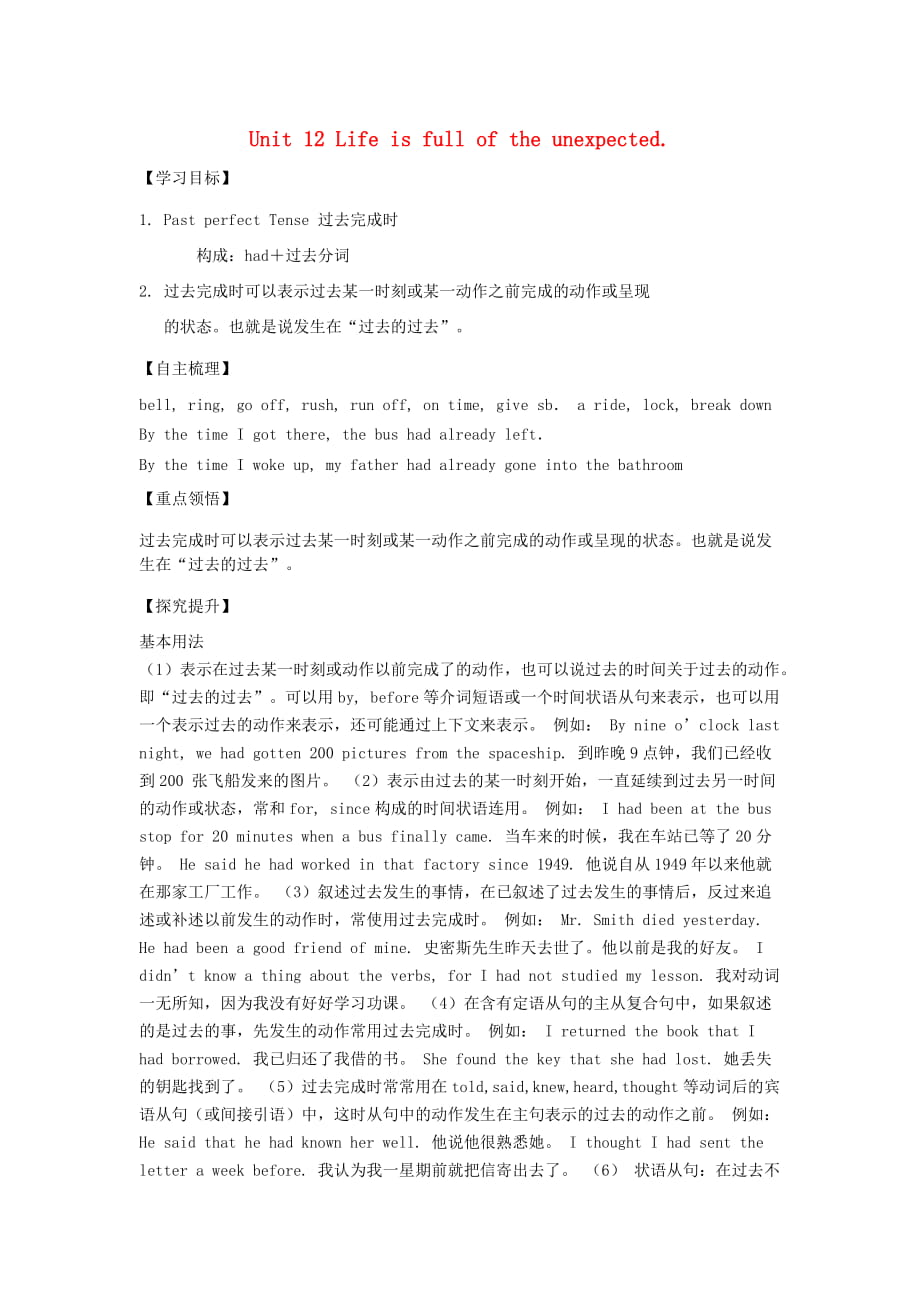《Unit_12_(第2課時(shí))學(xué)案_(新版)人教新目標(biāo)版》由會(huì)員分享���,可在線閱讀�����,更多相關(guān)《Unit_12_(第2課時(shí))學(xué)案_(新版)人教新目標(biāo)版(3頁珍藏版)》請(qǐng)?jiān)谘b配圖網(wǎng)上搜索。
1����、
Unit 12 Life is full of the unexpected.
【學(xué)習(xí)目標(biāo)】
1. Past perfect Tense 過去完成時(shí)
構(gòu)成:had+過去分詞
2. 過去完成時(shí)可以表示過去某一時(shí)刻或某一動(dòng)作之前完成的動(dòng)作或呈現(xiàn)
的狀態(tài)���。也就是說發(fā)生在“過去的過去”。
【自主梳理】
bell, ring, go off, rush, run off, on time, give sb. a ride, lock, break down
By the time I got there, the bus had already left.
By
2����、 the time I woke up, my father had already gone into the bathroom
【重點(diǎn)領(lǐng)悟】
過去完成時(shí)可以表示過去某一時(shí)刻或某一動(dòng)作之前完成的動(dòng)作或呈現(xiàn)的狀態(tài)。也就是說發(fā)生在“過去的過去”�。
【探究提升】
基本用法
(1)表示在過去某一時(shí)刻或動(dòng)作以前完成了的動(dòng)作,也可以說過去的時(shí)間關(guān)于過去的動(dòng)作��。即“過去的過去”����。可以用by, before等介詞短語或一個(gè)時(shí)間狀語從句來表示�����,也可以用一個(gè)表示過去的動(dòng)作來表示�����,還可能通過上下文來表示���。 例如: By nine o’clock last night, we had gotten 200
3�����、 pictures from the spaceship. 到昨晚9點(diǎn)鐘�,我們已經(jīng)收到200 張飛船發(fā)來的圖片。 (2)表示由過去的某一時(shí)刻開始�����,一直延續(xù)到過去另一時(shí)間的動(dòng)作或狀態(tài)��,常和for, since構(gòu)成的時(shí)間狀語連用���。 例如: I had been at the bus stop for 20 minutes when a bus finally came. 當(dāng)車來的時(shí)候�����,我在車站已等了20分鐘�����。 He said he had worked in that factory since 1949. 他說自從1949年以來他就在那家工廠工作��。 (3)敘述過去發(fā)生的事情,在已敘述了過去發(fā)生的
4�、事情后���,反過來追述或補(bǔ)述以前發(fā)生的動(dòng)作時(shí),常使用過去完成時(shí)���。 例如: Mr. Smith died yesterday. He had been a good friend of mine. 史密斯先生昨天去世了���。他以前是我的好友。 I didn’t know a thing about the verbs, for I had not studied my lesson. 我對(duì)動(dòng)詞一無所知���,因?yàn)槲覜]有好好學(xué)習(xí)功課����。 (4)在含有定語從句的主從復(fù)合句中��,如果敘述的是過去的事����,先發(fā)生的動(dòng)作常用過去完成時(shí)。 例如: I returned the book that I had borrowed.
5����、我已歸還了我借的書。 She found the key that she had lost. 她丟失的鑰匙找到了。 (5)過去完成時(shí)常常用在told,said,knew,heard,thought等動(dòng)詞后的賓語從句(或間接引語)中���,這時(shí)從句中的動(dòng)作發(fā)生在主句表示的過去的動(dòng)作之前���。 例如: He said that he had known her well. 他說他很熟悉她。 I thought I had sent the letter a week before. 我認(rèn)為我一星期前就把信寄出去了�。 (6) 狀語從句:在過去不同時(shí)間發(fā)生的兩個(gè)動(dòng)作中,發(fā)生在前����,用過去完成時(shí);發(fā)生在后����,用一般
6、過去時(shí)����。 如when,before,after,as soon as,till/until引導(dǎo)的 例如: When I woke up, it had already stopped raining. 我醒來時(shí)雨已停了。 She didn’t go to bed until she had finished her work. 她直到把工作做完之后才睡覺�。 注意:如果兩個(gè)動(dòng)作緊接著發(fā)生,則常常不用過去完成時(shí)�,特別是在包含before和after的復(fù)合句中,因?yàn)?這 時(shí)從句的動(dòng)作和主句的動(dòng)作發(fā)生的先后順序已經(jīng)非常明確�����,這時(shí)可以用一般過去時(shí)代替過去完成時(shí)�����。 例如: After he arrived
7��、 in England, Marx worked hard to improve his English. 馬克思到達(dá)英格蘭之后�����,努力提高他的英語水平���。 (7)動(dòng)詞think, want, hope, mean, plan, intend等用過去完成時(shí)來表示過去未曾實(shí)現(xiàn)的想法�����,希望����,打算或意圖等���。 例如: They had wanted to help but could not get there in time. 他們本來打算去幫忙��,但沒有及時(shí)趕到那里�。 We had hoped to be able to come and see you . 我們本來希望能來看看你。 (8)過去完成時(shí)還
8�、可用在hardly…when…, no sooner…than…, It was the first (second, etc) time (that)…等固定句型中。 例如:Hardly had he begun to speak when the audience interrupted him. 他剛開始演講���,聽眾就打斷了他���。 No sooner had he arrived than he went away again. 他剛到就又走了。 It was the third time that he had been out of work that year. 這是他那一年第三次失業(yè)
9���、了���。 時(shí)間狀語before,when,after,by+,until, once,had no sooner……than,yet��,already等���。
【鞏固訓(xùn)練】
單項(xiàng)選擇
1.He asked me __A___ during the summer holidays.
A. where I had been B. where I had gone C. where had I been D. where had I gone
2. What _D___ Jane ____ by the time he was sever?
A. did, do B. has, done C
10���、 did, did. D. had, done
3. I ___C___ 900 English words by the time I was ten。
A. learned B. was learning C. had learned D. learnt
4. She ___A___lived here for ______ years.
A. had, a few B. has, several C. had, a lot of D. has, a great deal of
5. By the time my parents reached home yesterday, I
11���、 __A___ the dinner already.
A had cooked B. cooked C. have cooked D. was cooked
6. She said she __D________ the principle already
A .has seen B. saw C. will see D. had seen
【學(xué)習(xí)反思】
______________________________________________________________________________________________________________________________________________________________
 Unit_12_(第2課時(shí))學(xué)案_(新版)人教新目標(biāo)版
Unit_12_(第2課時(shí))學(xué)案_(新版)人教新目標(biāo)版

